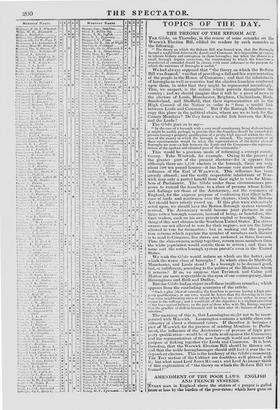TOPICS OF THE DAY.
THE THEORY OF THE REFORM ACT.
THE Globe, on Thursday, in the course of some remarks on tl Warwick Election Bill, edified its readers by such remarks the following.
le
_ -
« The theory on which the Reform Bill was framed was, that the Boron formed a useful link between the Lords and Commons. It is impossible, of cow% to tolerate bribery and corruption in these boroughs; but when the abuses iu small borough require correction, the constituency to which the franchise transferred or extended should be chosen with some reference to the purpose f Which the existence of Borouglis is useful."
We had always supposed that " the theory on which the Refer: Bill was framed," was that of providing a full and fair renresentati( of the people in the House of Commons ; and that the inhabitan of boroughs as well as counties had the elective franchise confer' upon them, in order that they might be represented according]. This, we suspect, is the notion which prevails throughout ti country ; and we should imagine that it will be a piece of news 1 the electors of Leeds, Manchester, Brighton, Cheltenham, Bat]
Sunderland, and Sheffield, that their representatives sit in U. High Council of the Nation in order to " form a useful lin
between Lords and Commons." But if the Borough Members oc cupy this place in the political chain, where are we to look for tI County Members? Do they form a useful link between the KM and the Lords ?
The Globe goes on to say— " In the case of a borough with a very small constituency being disfranchise( it might be useful, perhaps, to provide that the franchise should be extended t persons having a property qualification of a pretty high amount within the divi
mon of the county in which the borough is situated. The representatives t these constituencies would be what the representatives of the better class c Boroughs are now—a link between the Lords and the Commons—the represeu tatives of the opulent and educated part of the community."
This would be a precious mode of refbrming a corrupt consti tuency. Take Warwick, for example. Owing to the poverty a
the greater part of the present electors—for it appears tha although there are 1,150 electors in the borough, there are out
r about 500 ten pound houses—it has become very much under th influence of the Earl of WARWICK. This influence has beet grossly abused; and the really respectable inhabitants of War wick reap only a partial benefit from their right to vote for Mem
bars of Parliament. The Globe under these circumstances pro poses to extend the franchise to a class of persons whose habit: and feelings are those of the Aristocracy, not the commons o .... England, for the express purpose of einitinuing that illicit intlu ence of lords and gentlemen over the electors, which the Relbrn
Act should have utterly rooted up. If this plan were extensive]] acted upon, we should have the Rotten Borough system virtuall)
revived. The Aristocracy would become joint partners in on( large rotten borough concern, instead of being, as heretofore, dis tT5 tinet traders, each on his own private capital or borough. Some thing of this sort obtains in the Southern United States. The slave owners are not allowed to vote for their negrees, nor are the. lotto allowed to vote for themselves : but in making out the pepula• tiun returns which regulate the number of members each district iS to send to Congress, five slaves are reckoned as three freemen 'MRS the slaveowners, acting together, return more members than the white population would entitle them to return ; and thus iii some sort the rotten borough system prevails even in the United States.
We wish the Globe would inform us which are the better, and which the worse class of boroughs ? In which class do Sheffield,
Manchester, and Leeds stand? Is a borough to be deemed good, bad, or indifferent, according to the politics of the Members whom •
it returns? If so, we suppose that Tavistock and Caine and AIaltott are more respectable in the eyes of nur contemporary, than Birmingham and Bath and Dudley. But the Globe had an object in all these insidious remarks ; which appears from the concluding sentences of the article. "Stlat a plan [that of extending the franchise to persons having a high pro- petty qualification), at any rate, would be better than the thrum-nig in at nul- dam some neighbouring town or village which has no claim either 111 usage or reason to the suffrage ; and it would cut off the objections to a vigilant execution of the laws against bribery, on the part of those who, with Mr. Baring, suppose that the practice of disfranchisement will in time alter the balance of the Con- StittltiOnn"
The meaninv.t. of this is, that Leamington ought not to be Meer- porated with Warwick. Leamington contains a middle class con-
stituenev of about a thousand voters. If therefore it becomes a part of Warwick for the purpose of sending Members to Parlia- west, the influence of the Aristocracy—of persons of high ve- perty qualification—would be of little avail against the Commons; and the representatives of' the new borough would not answer the
purpose of linking together the Lords and Commons. It is best, therefore, that the Warwick Election Bill should be thrown out, and that the noble beroughmonger should still lord it over the in ,
dependent electors. This is the tendency of the Globes reasoning. The Tory section of the Cabinet are doubtless well pleased with it ; but what must Lord JOHN RUSSELL and Lord ALTHORP think of this explanation of " the theory on which the Reform Bill was flamed ?"
In e,
a
or
is
to
1,
k le
f t
















 Previous page
Previous page